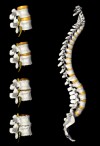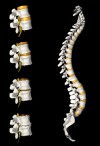Burlington Back Pain Clinic
In a previous blog we learned that being heavier doesn’t necessarily mean you’ll get degenerative disc disease. Although it seems logical that more weight will wear the spine down quicker, it isn’t necessarily the case when we look at the studies performed on the topic. Interestingly, genetics are one of the more reliable indicators of who will experience degenerative disc disease!

Degenerative Disc
Risk Factors for Degenerative Disc Disease
In the past it was generally understood that degenerative disc disease in the lower back was largely attributed to the things that you do with your spine. In other words, if you spend your life operating a jack-hammer, driving an eighteen wheeler, weightlifting, smoking and performing manual labour, you’d likely wear down your spine and experience degenerative disc disease. Although these types of things do play a role, they may not necessarily be causative. In fact (for example) the literature has shown that weightlifters don’t show an increased frequency of degenerative disc disease when compared to the general public!
Genetic Factors and Degenerative Disc Disease
According to the literature, the strongest predictor of degenerative disc disease is genetics. Perhaps it can be said that our spine shape is similar to other areas of our body. Our faces look like our parents so our spines may also. This means that your spine may have certain characteristics that make it more prone to injury (or degenerative disc disease in this case) than those people who don’t have a family history of the condition.
Treatment for Degenerative Disc Disease
Our knowledge of the spine and degenerative disc disease is changing. Family history can now be recognized as an important consideration in tailoring a treatment strategy for those with or without lower back pain. Of course, it is important to remember that genetics are not the only factor that relates to lower back pain and degenerative disc disease. Our postural habits, exercise habits (or lack thereof), profession; these all play a role. This new information just means that we need to view family history as a more reliable predictor for degenerative disc disease and combine this information with that listed above.
Looking for help with your lower back? Email us – info@burlingtonsportstherapy.com
References
Adams MA and Roughley PJ. What is intervertebral disc degeneration and what causes it? Spine 2006; 31(18): 2151-2161.
Beattie P. Current understanding of lumbar intervertebral disc degeneration: a review with emphasis upon etiology, pathophysiology and lumbar magnetic resonance imaging. Journal of Orthopaedic & Sports Physical Therapy 2008; 38(6): 329-340.
De Schepper EIT, Damen J, van Meurs JBJ et al. The association between lumbar disc degeneration and low back pain. Spine 2010; 35(5): 531-536.
Viderman J, Gibbons LE, Kaprio J, Battie MC. Challenging the cumulative injury model: positive effects of greater body mass on disc degeneration. The Spine Journal 2010; 10: 26-31.








